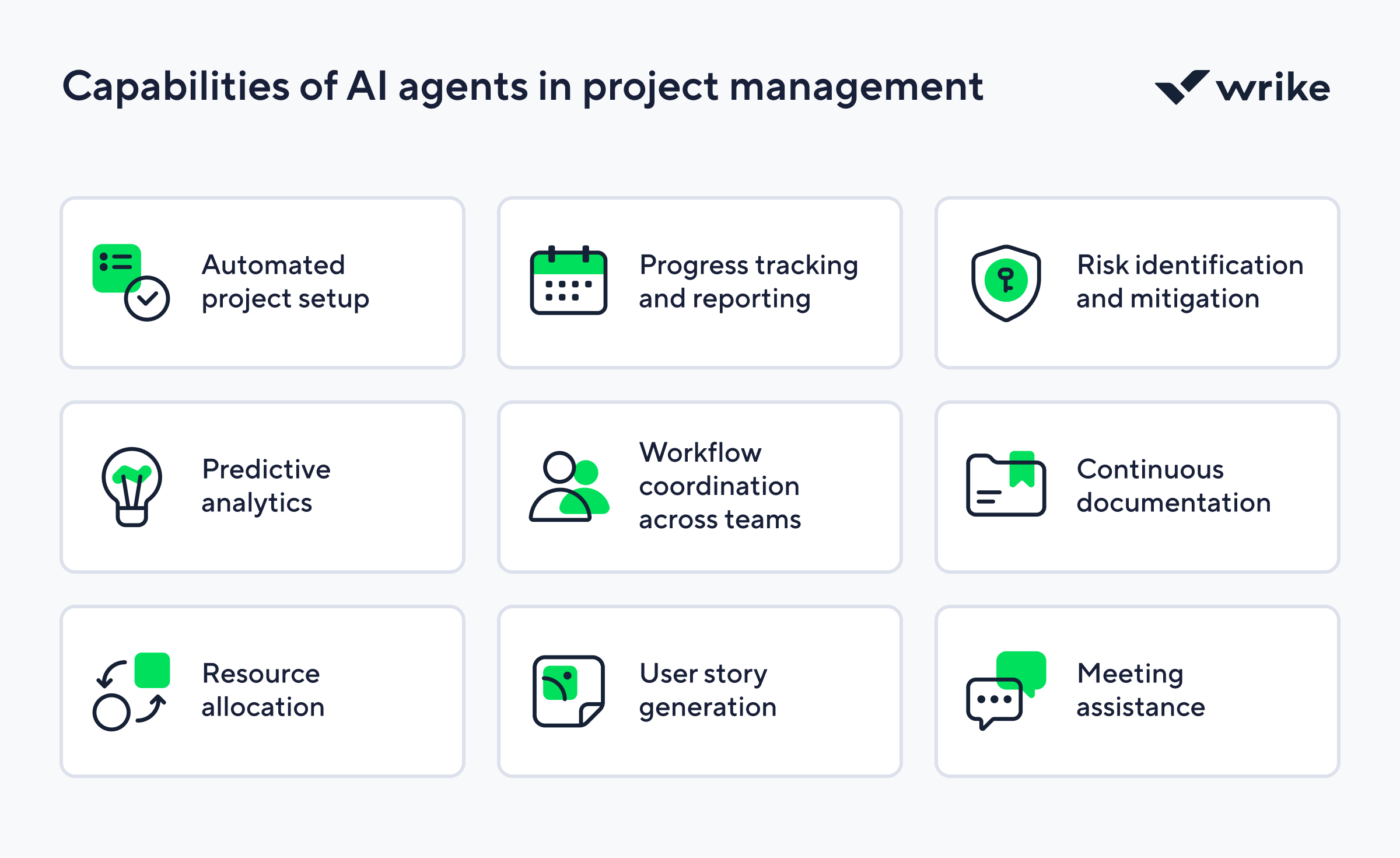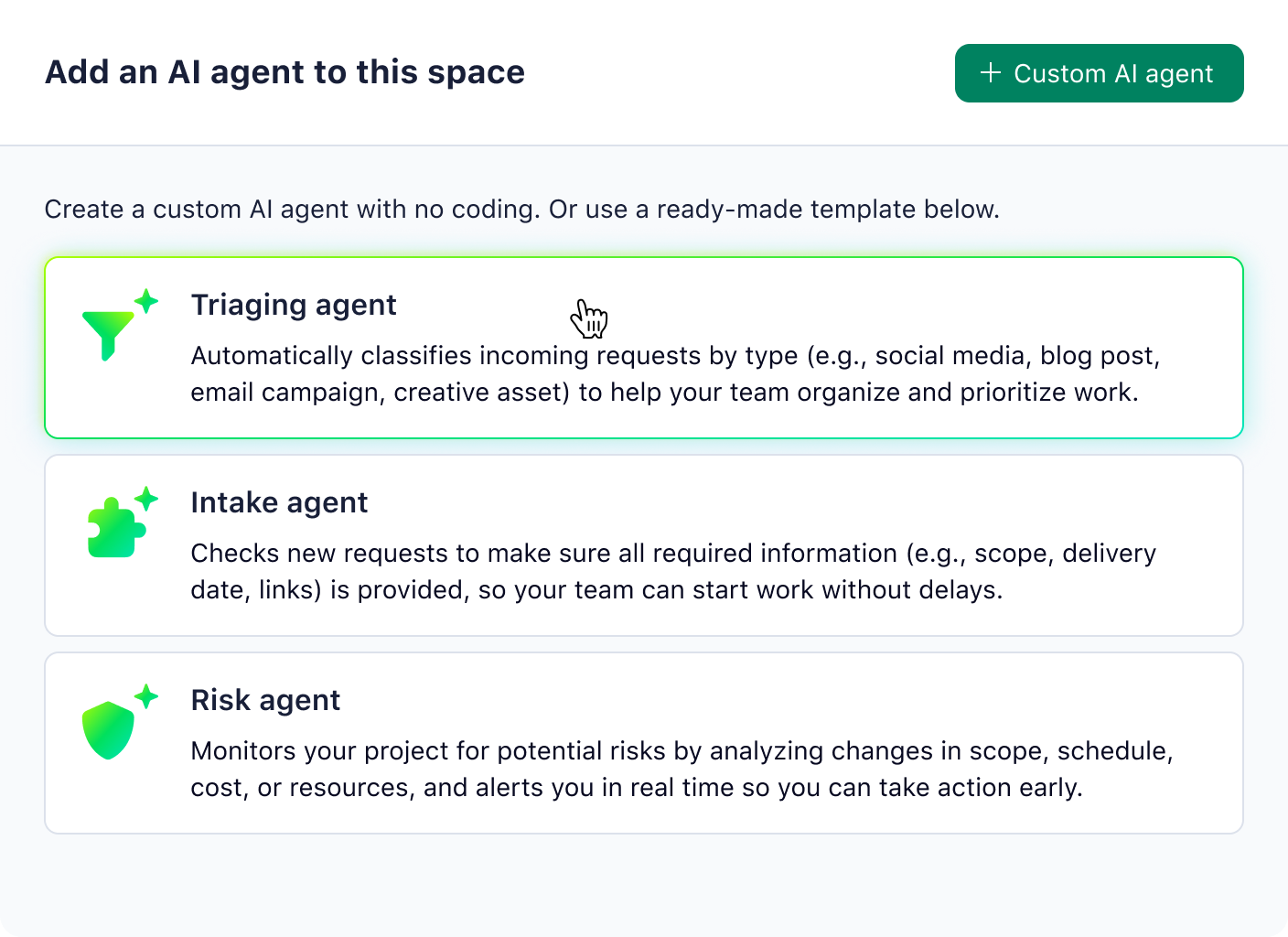Key takeaways:
- What are AI agents? AI agents are autonomous software systems that execute tasks like updating project statuses and reallocating resources, enhancing project management efficiency without manual oversight.
- How do AI agents differ from traditional PM tools? Unlike traditional tools that require manual input and are static, AI agents provide dynamic, real-time adaptability and comprehensive automation across project workflows.
- What are the benefits of using AI agents? AI agents automate busywork, identify risks early, streamline resource allocation, and enhance communication across teams, leading to improved project outcomes and productivity.
- Will AI replace project managers? No, AI agents augment project managers’ roles by handling routine tasks, allowing human leaders to focus on strategic decision making and team dynamics.
- How secure are AI tools in project management? AI tools designed for enterprise use incorporate robust security measures, including permission controls and compliance with data protection standards like GDPR.
What if you had a coworker who never clocked out — one who spotted delays before they spiraled, kept tasks moving with pinpoint accuracy, and didn’t add a dime to your payroll? That’s an AI agent. We’ve officially entered a new phase in project management, where intelligent automation has become your most reliable teammate.
Picture this: Instead of chasing down updates or digging through spreadsheets, project managers start their day with a clean dashboard, rich with real-time insights. Task statuses are already updated. Potential delays flagged, and resources rebalanced while they slept. The monotony of manual tracking? Replaced by intelligent systems that adapt as fast as a business moves.
This transformation is picking up speed. With intelligent systems stepping in, the global market for AI for project management is projected to grow from about $2.5 billion in 2023 to $5.7 billion by 2028. The teams leaning into these new capabilities are now reaping the benefits of working side by side with this digital workforce.
What are AI agents?
AI agents are software systems that can act on your behalf without needing you to click, drag, or follow up.
They’re not just “smart tools.” These agentic systems, built with machine learning and natural language processing technologies, are designed to act, not just analyze. Understanding how these differ from reactive tools like AI assistants is key, especially as the line between support and autonomy becomes clearer in the age of AI agents vs. AI assistants.
In project management, AI agents take on real responsibilities: updating project statuses, reallocating resources, coordinating across departments, and sending automated reports using live data pulled from your existing sources.
Think of them as autonomous digital teammates that free you from manual labor and let you focus on outcomes instead of operations.
They’re gaining ground fast. According to IBM, 86% of executives say AI agents will significantly improve process automation and workflow reinvention by 2027. These tools are built to handle complicated tasks and make decisions in dynamic environments, which is exactly what modern project management needs.
Traditional PM tools vs. AI agents
Even the most successful project managers can only juggle so much. Traditional tools, like Asana, Microsoft Project, and Trello, help track progress and assign tasks. Still, even the best project management tools often leave teams stuck in reactive mode, adjusting timelines manually, chasing updates, and managing miscommunications.
Here’s how traditional project management (PM) tools stack up against AI agents:
| Feature | Traditional PM Tools | AI Agents |
| Task assignment | Manual and static | Dynamic — agents can readjust assignments in real time |
| Adaptability | Limited to user input and fixed workflows | Continuously learns from changes and adapts automatically |
| Automation | Basic reminders and rule-based triggers |
End-to-end task automation, including decisions and follow-ups |
| Decision support | Relies on historical data and manual reports | Real-time analysis and recommendations drawn from live data streams |
| Human oversight | Requires frequent updates and approvals | Operates with autonomy but can escalate complex issues to humans as needed |
| Scalability | Harder to scale across large or complex portfolios | Easily manages multiple projects and teams with consistent oversight |
| Human errors | Prone to missed updates and miscommunication | Minimizes human errors with real-time syncing and intelligent task routing |
| Scope | Easily disrupted by changes or scope creep | Adjusts plans dynamically as scope expands, contracts, or evolves |
Early AI project management tools were built to support specific tasks, often requiring heavy human oversight and offering limited adaptability. And for project managers dealing with fast-moving projects or growing portfolios, that can be the difference between surviving and scaling.
Now, AI agents are capable of handling anything from shifting timelines to finding hidden risks before anything snowballs.
Key capabilities of AI agents in project management
Here’s where AI agents really prove their worth. From automating the busywork to spotting risks before they become problems, these intelligent systems are stepping up as real collaborators in modern project management.
Automated project setup
No more starting from scratch. Together, project planning and AI have changed the landscape before tasks are assigned.
AI agents can spin up project plans based on historical project data, templates, or even a few lines of natural language. Need to recreate a launch plan from last quarter or align timelines with this quarter’s sprint cadence? The agent can do it in seconds — dependencies, owners, and all.
Progress tracking and reporting
Manually updating spreadsheets and dashboards is a thing of the past. AI agents track progress in real time, highlight important details, and generate customizable reports that reflect the project’s actual state. That means fewer surprises and faster follow-through.
Risk identification and mitigation
These agents continuously monitor for red flags using historical trends and live project data. Slipping deadlines, resource bottlenecks, budget risks — they’ll flag them early and recommend mitigation strategies. That means you’re solving problems before they snowball, not after the damage is done.
Predictive analytics
By analyzing past project performance, team velocity, and resource behavior, AI agents can forecast potential delays, budget overruns, or missed milestones. Instead of reacting to what happened, teams can proactively steer around issues.
Workflow coordination across teams
Cross-functional doesn’t have to mean cross-chaos. AI agents bridge communication across tools and departments, making sure tasks flow smoothly from design to development to marketing. They follow the work, reassign it when needed, and ensure updates happen where everyone can see them.
Continuous documentation
Meeting notes, decision logs, and project summaries are all captured automatically. AI agents keep a running record of what happened, when, and why. That’s especially valuable for regulated industries or teams managing handoffs across time zones and functions.
Smart resource allocation
AI agents take the guesswork out of who should do what. By constantly evaluating team capacity and matching it with current project needs, they make sure the right people are focused on the most impactful work. It’s a smarter way to keep progress moving without stretching anyone too thin or leaving priorities hanging.
User story generation
Imagine skipping the manual work of turning stakeholder requests into actionable user stories. AI agents can instantly draft clear, structured user stories from project notes, documents, or even casual conversations. That means less time spent clarifying requirements, quicker alignment between teams, and fewer delays caused by ambiguous tasks.
Meeting assistance
AI agents can prep for meetings, summarize discussions, track follow-ups, and even update project boards based on what was agreed. That means less time spent recapping and more time executing.
These capabilities only scratch the surface. As more types of AI agents continue to emerge, projects will continue to push past the limits of traditional workflows and use AI tools for smarter project management.
Examples of AI agents in project management
Wondering what it looks like when AI agents join your project management team? From automating workflows in the construction industry to accelerating decisions through communication platforms, AI agents and agentic workflows are helping teams stay agile and drive serious gains in team productivity.
Let’s take a look at how leading companies are putting them to work.
PepsiCo
Partnering with Salesforce’s Agentforce platform, PepsiCo will deploy autonomous agents to streamline support, improve efficiency, and let sales teams focus on high-impact growth. As one of the first major food and beverage brands to roll out Agentforce at scale, PepsiCo is moving from AI exploration to execution.
Workday
Workday is bringing AI agents out of the lab and into the business. Its new lineup, known as Illuminate Agents, tackles everything from sourcing talent and reviewing contracts to automating frontline tasks and accounting workflows.
These AI-powered tools are built with deep context from HR and finance data, giving teams smarter decision support like screening applicants or flagging compliance risks.
Siemens
At Automate 2025, a robotics and automation event, Siemens unveiled a new wave of industrial AI agents built to work autonomously across its Industrial Copilot ecosystem. One agent autonomously renegotiates supplier agreements based on materials cost fluctuations, while another predicts machine failures, reportedly cutting reactive maintenance time by 25% on average.
Trunk Tools
Trunk Tools has built AI agents for construction workflows. These agents turn unstructured data like blueprints and schedules into structured, queryable formats and autonomously handle tasks such as scheduling and project tracking.
Challenges of AI agents in project management
But nothing is perfect, right? As AI agents gain ground in project workflows, they also raise a few concerns in the field. From trust to talent gaps, teams still must clear hurdles to make the most of agentic AI.
- Earning trust takes time: AI agents can act autonomously, which means handing off more decisions to machines. That shift doesn’t happen overnight. Teams need time and evidence to trust that AI is supporting, not disrupting, their goals.
- Bridging the skill gap: Even user-friendly tools still demand some level of AI literacy. Teams may need to upskill in areas like prompt engineering, data interpretation, and workflow configuration to fully grasp their value.
- Job security fears still linger: For project managers and operations teams, questions around job displacement are real. Leaders should communicate clearly how AI expands human capacity, not replaces it, and invest in responsible AI strategies that prioritize people.
- Privacy and data governance: AI agents often rely on large language models (LLMs) and connect to sensitive project data, making security, compliance, and control non-negotiable.
Can AI agents replace project managers?
In short, it depends. When it comes to navigating team dynamics, interpreting nuance, or making high-stakes judgment calls, there’s still no substitute for human leadership. But AI agents are reshaping what organizations expect from their project managers.
If you’re a project manager who understands agentic systems and knows how to work with AI tools, you’re already ahead. If not, now’s the time to level up because the pace of change isn’t slowing down.
How Wrike uses AI agents in project management
As teams move faster and tech stacks get smarter, project management software that can’t keep pace becomes the bottleneck. The future belongs to platforms that can think, adapt, and act right alongside their users.
Wrike’s AI agents keep work moving effortlessly. The risk agent spots delays early, the triage agent routes tasks to the right people, and the intake agent organizes new requests instantly. Plus, with the no-code agent builder, you can create or customize your own AI agent in seconds.

Wrike is already helping teams realize the real value of agentic AI. And this is just the beginning. Because the future of project management isn’t just faster. It’s smarter — and Wrike is building it right now.
FAQs
What are AI agents in project management?
AI agents are intelligent systems that can act autonomously within a project management environment. Instead of waiting for a prompt, they can make decisions, assign tasks, track progress, and even resolve issues based on real-time data and context. Their goal? Help teams move faster, reduce repetitive tasks, and unlock more strategic bandwidth for project leaders.
Will AI replace project managers?
No, but it will change the role. AI agents handle the heavy lifting behind the scenes, like monitoring risks or updating timelines. Project managers remain essential for navigating human dynamics, making strategic decisions, and steering teams toward outcomes that align with broader business goals.
How do AI agents prioritize tasks?
AI agents use machine learning, historical project data, and current workload information to determine which tasks need attention first. They also factor in due dates, dependencies, resource availability, and potential blockers to keep everything on track.
How is AI used in project management?
Today’s AI agents support everything from automated reporting and resource allocation to risk mitigation and workflow coordination. They surface insights, trigger updates, and reduce manual work — freeing teams to focus on more meaningful, high-impact initiatives.
Are AI tools secure for enterprise project management?
Yes, if implemented thoughtfully. Leading AI platforms are built with enterprise-grade security and governance controls. That includes permission-based access, audit trails, and compliance with frameworks like GDPR and SOC 2. Security should be a foundational part of any AI deployment strategy.







